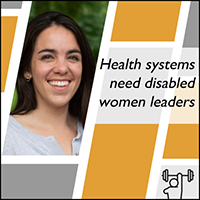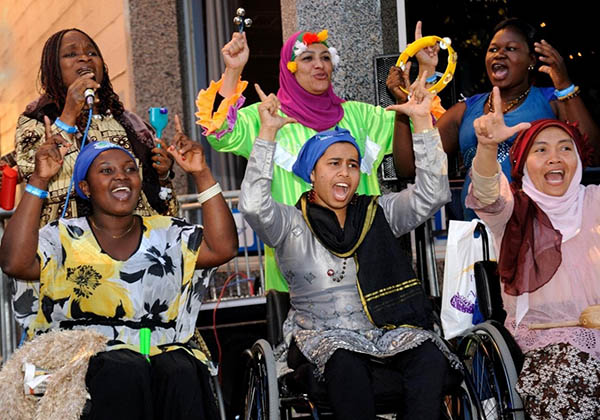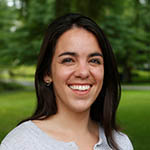Health systems need disabled women leaders

![]()
1 in 5 women and girls worldwide live with some form of disability. Disabled women and girls commonly face multiple, aggravated forms of discrimination on the basis of both gender and disability, and often on account of their age or other social categories as well.
Women and girls with disabilities are three times more likely than disabled men to be illiterate or have unmet health needs, and half as likely to be employed; among those employed, disabled women are half as likely to be in leadership positions. As shared in the blog from Women Enabled International, disabled women and girls experience a multitude of barriers to realizing their right to health, much more so than their non-disabled peers.
Disabled women and girls are commonly shut out from the spaces where health system decisions are made and policies are crafted. They are wrongly viewed as only beneficiaries of care with specialized and complex needs, rather than as the rights-bearing health care consumers they are. While it should seem obvious, it is commonly overlooked that while a disabled woman or girl may experience specialized health needs specific to her disability, she also experiences the same health needs as her non-disabled peers, from education about health and nutrition, to access to contraception and comprehensive obstetric care, to screening and preventive services for heart disease or cervical cancer, and so on.
Disabled women and girls are the experts on their own needs and on the barriers they face. They hold enormous untapped potential and have taken leadership in creating innovations that result in more accessible, equitable and responsive health systems. As Mobility International USA (MIUSA) has often asked: Imagine what could be possible if women and girls with disabilities were included in leading health and development programs?
For the past decade, MIUSA has been developing the leadership skills and networks of disabled women from over 89 countries through its flagship program, the Women’s Institute on Leadership and Disability (WILD) to “infiltrate” health, human rights and development programs. WILD brings together groups of disabled women with demonstrated leadership potential for cross-country and cross-disability exchange, intensive leadership training and mentoring, and exposure to effective disability rights policies and practices. WILD gives women with disabilities the chance to experience accessibility, gain leadership skills, and spread that opportunity around the world, returning to their countries and working with their communities to break down barriers.
Under the USAID-funded Leadership, Management and Governance (LMG) Project from 2012 to 2016, Management Sciences for Health (MSH) partnered with MIUSA to support and grow the WILD program by documenting the approach, developing a facilitator’s guide, and designing a training-of-trainers (ToT) program. The ToT approach creates a multiplier effect: disabled women leaders partner with mainstream women’s organizations and replicate WILD in their countries which both spreads effective leadership practices to more women and raises the visibility of disabled women’s capabilities, countering common biases about disability. The partnership helped double the number of disabled women trained with MIUSA’s WILD methodology from 200 to over 400. MIUSA’s WILD Facilitator’s Guide is now available in Arabic, English, French, and Spanish.
WILD has demonstrated that when disabled women organize and gain access to spaces and resources to exercise their agency and apply their ingenuity to knocking down the persistent barriers that deny their rights and limit their participation—they can be leaders of transformative social change. Following the program, WILD alumnae have gained media exposure, mobilized new funding or in-kind support, launched new disability-inclusive initiatives, founded organizations and networks, and created new partnerships with government agencies and development programs.
MIUSA has continued delivering their WILD program since the LMG Project ended, reaching nearly 60 additional women globally, who are applying their enhanced skills and confidence, and using seed grants to train over 1100 women with disabilities at their community levels. All WILD women are implementing creative solutions to health and social challenges in their communities.
What development program managers and health sector leaders can do support disabled women and girls:
- Hire disabled women.
- Partner with disabled women’s organizations address barriers and discrimination experienced by disabled women and girls and design disability inclusive programs.
- Provide reasonable accommodations and budget for inclusion to enable participation.
- Track the meaningful participation of persons with disabilities—including women—in development, implementation, and monitoring of programmatic activities.
- Integrate disability-sensitive measures into the design, implementation, monitoring and evaluation of all development policies and programmes.
MIUSA, a member of the Consortium for Building Inclusive Societies (CBIS), and MSH plan to further expand the reach of WILD’s approaches and create new leadership opportunities for disabled women through the One Billion Voices Project, a top contender for MacArthur’s 100 & Change competition.
Learn more about WILD:
 Image credit: kiefelphotography.com © Mobility International USA
Image credit: kiefelphotography.com © Mobility International USA
ABOUT THE AUTHOR
 Kate Henderson has 12 years of experience in international development. She is a skilled facilitator with expertise in health systems strengthening, group dynamics, and leading effective change. Kate has facilitated participatory governance and organizational capacity assessments, alignment meetings, strategic planning, leadership development programs, policy dialogues, and training of trainers programs for health and human rights professionals, service organizations, and government institutions in 19 countries. She has contributed to the development of technical resources and provided virtual coaching to teams in more than 50 countries across Africa, Asia, the Middle East, and Eastern Europe. Henderson is a regular contributor to MSH’s new business development, frequently designing components of technical strategies related to leadership and governance. She has expertise in building high performing teams—including mentoring and supervising staff, leading cross-functional teams, and coordinating stakeholder working groups and coalitions. She holds a Master of Public Health with a concentration in global health management.
Kate Henderson has 12 years of experience in international development. She is a skilled facilitator with expertise in health systems strengthening, group dynamics, and leading effective change. Kate has facilitated participatory governance and organizational capacity assessments, alignment meetings, strategic planning, leadership development programs, policy dialogues, and training of trainers programs for health and human rights professionals, service organizations, and government institutions in 19 countries. She has contributed to the development of technical resources and provided virtual coaching to teams in more than 50 countries across Africa, Asia, the Middle East, and Eastern Europe. Henderson is a regular contributor to MSH’s new business development, frequently designing components of technical strategies related to leadership and governance. She has expertise in building high performing teams—including mentoring and supervising staff, leading cross-functional teams, and coordinating stakeholder working groups and coalitions. She holds a Master of Public Health with a concentration in global health management.




Responses